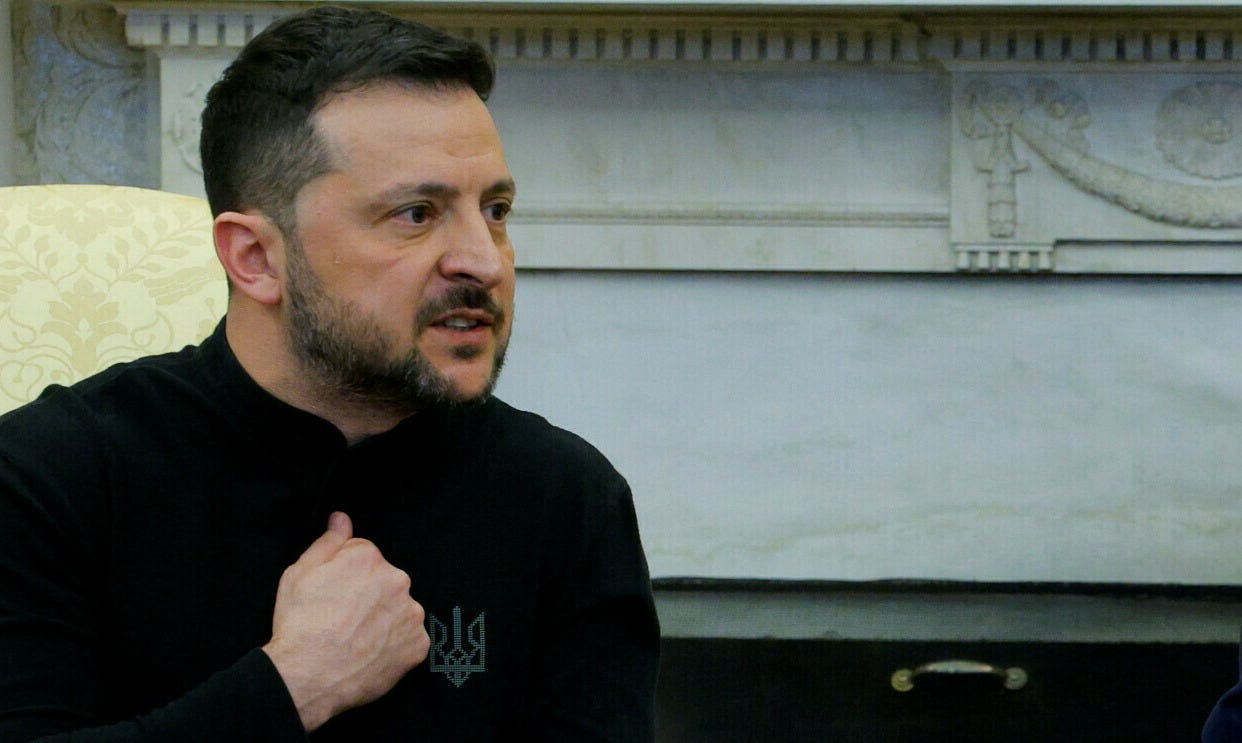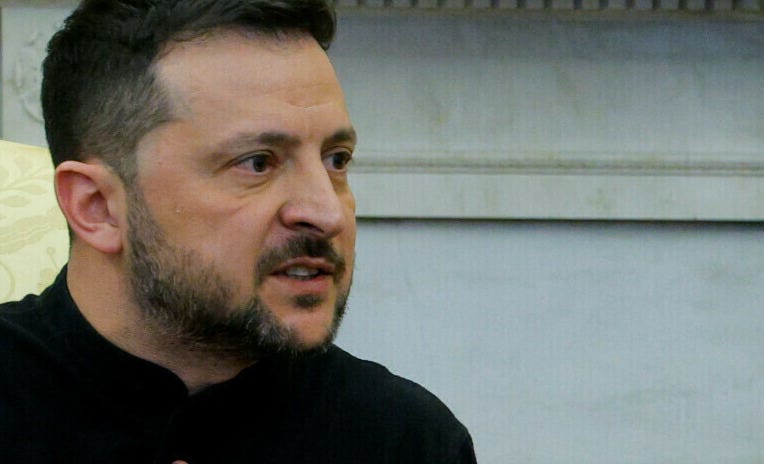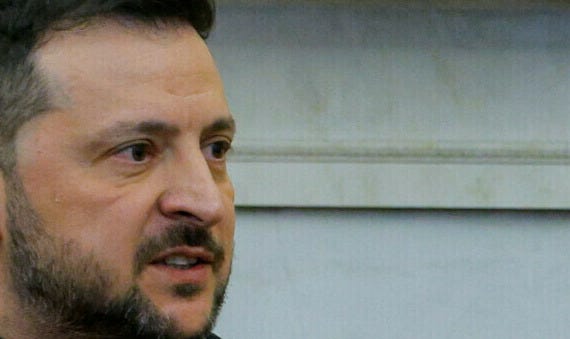One of the many delicate horrors of being alive right now is the way the world threatens to turn us into what T.S. Eliot once called "a patient etherized upon a table."
Eliot was referring to that particular pallor of an October sky in that dead moment between day and night; for us, this is simply a description of being numbed by the sheer magnitude of events coming at us.
We live in a moment of acceleration. We are at the mercy of something hard to describe but easy to sense, an overload of news and clicks and likes and posts and clips and music and podcasts, an inescapable infinitude, a continuous unfolding, a cacophony of events in which we are so deeply enmeshed that we are at threat of losing ourselves.
The question at hand is how to respond. How to process, how to keep up. We are tempted, like Eliot's sky, to fall into a stupor. To become a patient lying etherized on a table. Lifeless, drugged. And if that happens – if we lose our ability to respond – then we have lost something essential.
So the way to respond is to not become numb.
What you feel, your gut response, your fury and joy and outrage and anguish, is the human defense against this neverending acceleration. It is perhaps the only one we have.
And so when something happens like the ambush of Volodymyr Zelenskyy by Donald Trump and J.D. Vance in the Oval Office on Friday, the proper response is to feel.
I'm not here to try to tell you how to react to Trump and Vance and the rest of their coven. You are your own person.
But what I can do is explain my own response as clearly as I can.
Let me start by saying this: that Oval Office event was the single most shameful display by American politicians in recent history.
It laid out nakedly before us the personal moral cowardice and base stupidity of the two highest elected officials in American life. It evinced a blundering incompetence and arrogance so great as to be the exact opposite of everything one would hope for in someone occupying higher office.
These men, Trump and Vance, have no wisdom to speak of. Their leadership qualities are nonexistent. They do not know how to relate to non-sycophantic human beings. They possess little intelligence and less knowledge of history and foreign affairs.
Whay they do possess is moral repugnancy, along with a stupendous, epoch-destroying narcissism.
They represent a stain on American honor.
Now, before we go any further, since we're talking about my personal reaction, I should note that I've never been much stirred by the notion of honor. It has always seemed to me to be an externally-driven feeling, dependent on how others see you.
My personal inclination, instead, has always been to abide by the dictates of integrity. To my way of thinking, this is an internally-driven feeling, dependent wholly on how you see yourself.
I suspect this inclination in me may come from the fact that, somewhere, deep down in myself, beneath all the anxieties and insecurities that I – like everyone alive – wrestle with, I don't really care in the slightest what other people think about me.
This is a constitutional condition, not a chosen one. It's simply something I feel.
Not to be dismissive of you, dear reader, but you are not in my head; you don't know what it feels like to be me or to be presented with the drives and fears and challenges and desires that I live with, as you live with yours.
Most importantly, you won't be with me in the final moment that I slip out of this world to whatever comes next. But do you know who will be with me in that moment, when the darkness strides forward to embrace me? I will.
I will be the one answering to myself the question of what it was I did with my one precious chance to be alive in this world – with its astounding beauty and terrible tragedy, its days of sunlight filtering through pine trees and of cool breezes filtering over movie sets at the golden hour – I will be the one in that moment asking myself how well I did with the single chance I had. So I'm the one I'm worried about.
Now we can debate the terms I'm using – honor and integrity – but putting the linguistic particulars aside, I do think it's worth noting that mine is a very American stance.
The dream of individualism, of independence: these are American social traits, and so it's no surprise that someone like me – coming from the land of Emerson and Thoreau and raised in the Rocky Mountain West with romantic images of cowboys riding solitary across the plains – is imbued with them. Had I been born in a culture, or a region, or a family more oriented towards communal life, towards shame as the method of confronting bad action, I would feel differently.
But I didn't, and I don't. I'm an American and this is the place that has formed me, for better or worse.
Why am I talking about this?
Because even I, who couldn't give a flying flapjack what you think of me, understand that there are moments when all of my personal actions cannot disentangle me from the identity of the place from which I come.
I know this because of how I talk to foreigners about the Vietnam War. I was born in the year the last American troops were withdrawn from that country, and thus I could have had nothing to do with that event. But the truth of the Vietnam war is that it was a tragic fuckup of monumental proportions, brought about by American blundering, ignorance, and arrogance.
It was based on flawed assessments of international politics and of other cultures (there was never a chance that the Americans could have installed the kind of regime they wanted in Vietnam; they (we) were throwing themselves (ourselves) against an impossibility); it involved a morally dubious view of action on the world stage (even the most realpolitik thinkers are forced to bob and weave at the notion that one nation has the right to determine the government of another); it revealed a military hubris so great that it can only be read as idiocy and a series of strategic mistakes that are now taught as "how not to do it" in various military academies; it killed nearly 60,000 American soldiers and wreaked mental and physical havoc on the ones who survived; it tore deeply into the fabric of American life; and most importantly, it killed somewhere in the vicinity of three million Vietnamese, lead directly to the ascent of the Khmer Rouge in Cambodia (who would kill somewhere close to a third of their own population), wreaked havoc on Laos, and destabilized an entire region of the world.
I was not alive, as I said, while most of this was happening. But when talking about it, particularly to foreigners, my response is certainly not, "Fuck yeah, America's awesome!" Nor is it, "Phew, glad I didn't have anything to do with that one!"
My response is that it was a tragedy instigated by America, and I am an American, and so it is in some way connected to me.
There is something right and proper in this, for down in the roots of my existence, in the place where my beliefs about things like integrity were formed – by being born into this culture, being shaped by it, participating in it – down there in the roots, the same thing that helped form me is at least in part the same thing that helped create the tragedy of the Vietnam War. We were molded, the war and I, from traces of the same clay.
Responsibility is a moot point here. Yes, I had nothing to do with landing the Marines at Da Nang in 1965, but the clusterfuck that ensued is a part of me, as are, incidentally, the landings on D-Day, the enslavement and liberation of African Americans, the burning of women as witches at Salem, the landing on the moon, and all the rest.
This, folks, is how history and identity work.
One can protest one's own culture, one can fight like hell to shape it, but one cannot exempt oneself from it.
So, yes, there is such a thing as national honor, and national culture, and national shame, and Trump and Vance are in the process of defecating all over it.
Moral clarity in war is a rare thing.
The business of war is the business of killing other human beings to force their side to do something, and it's a ghastly business. There are often wars in which the moral claims of each side are remarkably complex, and a large part of the tragedy comes from the fact that the origins of the dispute are so difficult to disentangle, or so absurd (as in the first World War) that one feels little more than a sense of confusion about the right course of action (other than actual, true, lasting peace, which is always the right course of action).
The war in Ukraine is not one of these confusing ones.
There is no rational or ethical case to be made for the Russians. "We want to take over your country" is not a justification for war. "Sometime back in the mists of history we dominated you, and now we want to do it again" cannot be a moral reason for killing anyone, let alone large numbers of people.
What has Zelenskyy done? Regardless of his flaws as a human being or a leader, he has managed to lead a much smaller nation in holding off the unprovoked and immoral assault of a much larger and more powerful nation.
What have the Ukrainians done? For some three years now, they have lived the kind of lives that most of us here in America us only read about in books. They have seen their homes and cities shelled into ruin. They have seen their friends and children and parents and lovers go off to a battlefront that is not far away in some other land but is in their country, is their own country, to kill and be killed and lose limbs and then go back to fight again.
Why? For a simple reason. They're not Russian, and they don't want to live in an authoritarian Russian State and be ruled by a deranged Russian dictator.
This is not a morally complicated situation. And it is a cause that American culture believes in.
Now, to say that American culture believes in freedom is not to ignore the manifold times that we've gotten it wrong, from the assaults on indigenous people to slavery to Vietnam to Iraq and beyond.
But it is to say that the notion of fighting for freedom, the ideal of it, the dream of it, is a deep and abiding element of who we are.
All the aspirational stuff? About truth and justice and giving us "Your tired, your poor, your huddled masses yearning to be free"?
It's not bullshit.
It's the arena in which we fight to decide who we really are.
It's the ground over which our communal moral life is contested. It's there in writing and in the artifacts of our culture, and because of that it has an existence. Lived up to or not, it has an existence.
What Trump and Vance did in the Oval Office was not an attempt to deny that part of us; it was, instead, an attempt to pervert us. It was the latest and most visible front in their fight to align us with the forces of anti-freedom, to make us odious in the eyes of others and in the eyes of ourselves.
These men – Trump, who would sacrifice anything living or dead, sacred or historic, for his megalomania, and Vance, in possession of an intellect and soul so half-formed that he is forcing the nation and the world to take the brunt of his daddy issues – have neither honor nor integrity. This is not an arguable point.
And they are our elected representatives, our faces to the rest of the world, so their actions stain all of us.
So what do we do?
We certainly don't let them assault us into submission. We certainly don't allow ourselves to be transformed into Eliot's patient, etherized upon a table.
Instead we allow ourselves to feel our response – mine is white hot fury – and then we take whatever actions are available to us, and maybe some that we don't think were available before now.
We reach back to the best of us, for they are still in us too – because that, also, is how culture and history work – and we absolutely refuse to accept that this is who we will allow ourselves to be.
Organize. Fight. Demand that your elected representatives respond. Don't let the trolls win online. Get in the streets. Read your history. Find someone you know, or a dozen people you know, and shake them into awareness. React the way you feel you should.
As another noted American philosopher, Johnny Utah, once said: "Feels good, right? Like you're still alive?"
Yeah, it does. And you won't get another chance at it.









Great post.
I'm glad you took the time to lay out precisely what your background is and where you are coming from because it really contextualizes what bothered you the most out of that repugnant shitshow, and why. So many things are taken for granted when talking about politics, so much is left to 'common sense' or 'that's just obvious', particularly when writing to a specific audience, that so much of what would provide the most valuable discourse winds up never even being addressed. I have to confess, this is the kind of commentary that I wish was more predominant right now. Trump's first term was marked by strong, vocal opposition from day one. It wasn't always effective, but it was there, and it inarguably helped curtail some of the more odious attempted policies. His second term, on the other hand, has been marked by the opposite: capitulation, normalization and a lack of organizing. To quote another T S Eliot poem: this is the way the world ends/not with a bang but a whimper.
As someone who was lived in the US for extended periods of time, at different points in my life, but is not from the US, my thoughts on Ukraine-Russia are a little more complicated. There is absolutely no question that this is an expansionist war of aggression on the part of Russia, that they have no moral standing whatsoever and that, legally (and morally) speaking, invading armies have no rights, they have responsibilities, the chief responsibility being reparations. I know that might seem 'common sense' or 'obvious', but I want to get it out of the way because I don't want what I'm about to say next to be misconstrued: NATO expansionism has been antagonizing Russia since 1989. The organization was created (supposedly) as a military alliance of US-aligned countries to combat the military alliance of Soviet aligned countries. But as soon as the Soviet Union collapsed, and the threat disappeared, NATO didn't go away. It got bigger, recruiting more and more countries, adding more and more bases, encroaching closer and closer to Russia year by year until it reached its very border. The US can claim that there were never any official talks for Ukraine to join NATO, and that may be technically true, but its eventual incorporation has been treated as a foregone conclusion for a while, and NATO officials have repeatedly reiterated (as recently as 2021) that Ukraine would eventually join NATO, despite the fact that before the Russian invasion the population of Ukraine expressed relatively low support for joining NATO (since 2022 support has skyrocketed, which is completely understandable). None of this justifies Russia's invasion, which is completely unjustifiable, but it helps explain it. I don't think it's too difficult to imagine what US reaction would be if China entered into a military alliance with Mexico and installed a series of bases there, for example.
Which brings me to the Trump-Vance-Zelensky shitshow. I don't think it's controversial to say that NATO has been using the Russia-Ukraine conflict as a proxy war, or that the US and UK sabotaged ceasefire talks during the earliest days of the invasion. I also don't think it's controversial to say that the only realistic resolution has to be a diplomatic one, and that any armed conflict between nuclear powers (proxy or not) has potentially world-ending consequences. But that's not where Trump is coming from. He implies that it is, in order to curry favor among a certain segment of the population, but that debacle made it abundantly clear to anyone with eyes and ears that the only thing he cares about is extorting Zelensky into giving the US access to Ukranian natural resources, and humiliating the man in order to prove a point to his base (America first, bullies of the world, we take what we want and give nothing back, medicaid? what medicaid? never heard of it). He's not the first (or the 46th) US president to extort another country out of their resources, but he's the first one (of my lifetime, at least) to have been so shameless about it, so naked, to have so actively pursued the public humiliation of his counterpart, even at the potential expense of the deal. It was a display of power by a one-dimensional psychopath (I don't think that's controversial to say either) intended as both entertainment and anesthetic for a base of frightened and insecure little boys and girls with a seemingly pathological need for an authoritarian father figure who will protect them from the dangers of people who don't look exactly like them simply trying to exist.
Apologies for the wall of text, but I guess I was in a mood. I know this isn't exactly the main theme of your Substack, and I wouldn't want you to wind up permanently drifting too far from more (directly) film-related commentary, but you've been knocking it out of the park with your posts about politics and morality. There's way too much of the both-sidist, walking-on-eggshells, let's do everything but call a spade a spade crap out there. This is real. And it's good. And it's valuable. And it's necessary.